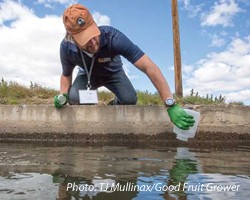Agricultural Water Test Sample Drop-Off Sites in Western NY
Robert Hadad, Extension Vegetable Specialist
Cornell Vegetable Program

If you are curious about the quality of your irrigation ponds, streams, wells, or other surface water source, water testing is an important tool to consider. If your buyer wants you to get an audit and be certified under GAPs, Harmonized GAPs, or other third-party program, water testing becomes a requirement. Water testing that provides meaningful results requires a quantified generic E. coli test or an Enumeration E coli test. Some water testing labs only do a potable water test called a presence/absence test. The Enumeration test provides test results as in numbers of (bacterial) colony forming units (CFU or most probable number MPN). Having a number allows you to track the results with a comparable baseline. Each water source should be tested 3-4 times a season and do this each growing season.
Sampling should occur early in the season then again before key harvest times during the season. So, for example, if your first harvest is in late June, sample early June, then in again in early/mid-July, early/mid-August, and if there are significant crops, like leafy greens going into the fall and irrigation is still needed, then sample in mid-September. Sampling could be done after a large rain event where a lot of runoff gets into your water sources. During real dry spells, if pond levels drop a lot, test then too.
Water samples need to be kept cool and tested within 8 hours of when the sample bottle was filled. This is critical! Many counties don't have local water labs that can do these tests and getting them to other labs can mean hours on the road. One solution here in WNY comes from water test sample drop-off sites; refer to the PDF listing of locations. Specific instructions can be found along with the sample bottles at each site. Pay the fee (ranges from ~$50-$60 each), get the bottle(s), fill out the form, follow the sample instructions, and get the bottles back to the drop-off site before 9:00 am on the day of the week specific to that location.
- Drop-off/pick-up sites have been set up in a number of locations across the region by Lozier Environmental Consulting in Rochester. Water test sample bottles, forms, and information are available at each site. For quantitative generic E. coli water testing (farm food safety) use the Enumeration test option. There are other water tests available for farm and home: well water tests, chemical, and others. The lists can be found with the forms and bottles at the sites.
- If you are in Ontario County, contact Nancy Anderson at the CCE Ontario County office in Canandaigua at 585.394.3977 x427. You can pick up the supplies (forms, bottles, instructions, and takes payment) at the CCE office. You will be required to take your sample(s) to a drop-off site in Canandaigua; the bottles will be picked up and delivered to Life Science Labs in Syracuse for analysis.
Agricultural Water Test Sample Drop-Off Sites in Western NY (pdf; 286KB)
- Download the PDF for a list of locations and drop-off deadlines.

Upcoming Events
African Eggplant Participatory Breeding Kick-Off
March 5, 2026
Join us to learn about the Cornell African Eggplant Research Project and learn how you can participate! African eggplant, also known as Bitterball, Garden Egg, Kittley and other names, is an important crop for many members of our community with heritage from regions such as sub-Saharan Africa, Southeast Asia, and Brazil. Since 2024, the Cornell African Eggplant Research Project has been collaborating with growers and community partners across New York to develop high-quality varieties adapted to the Northeast U.S. In this meeting, we will share information about growing and preparing African eggplant, highlight our research to date, and invite partners to collaborate with us in our 2026 participatory breeding and variety selection efforts.
COST: FREE! You must pre-register to receive the Zoom link.
Managing the Invasive Swede Midge Webinar
March 6, 2026
Swede midge is an invasive fly that causes serious economic losses to brassica crops. Due to its small size and hidden feeding habits, swede midge is often called an "invisible pest" and damage may be misdiagnosed. In this webinar, we will review the swede midge life cycle and crop damage symptoms, current management recommendations, new research findings, and highlights from on-farm case studies with a focus on organic management.
1.75 DEC pesticide recertification credits in categories 1a, 10, and 23.
Good Agricultural Practices (GAPs) Food Safety Training
March 10, 2026
Newark, NY
Learn about food safety on the farm! This event hosted by the Cornell Vegetable Program, Cornell Lake Ontario Fruit Team, CCE Wayne County, and the NYS Department of Agriculture, will cover good agricultural practices (GAPs) to help reduce the risk of microbial contamination on the farm, keeping food and consumers safe.


































